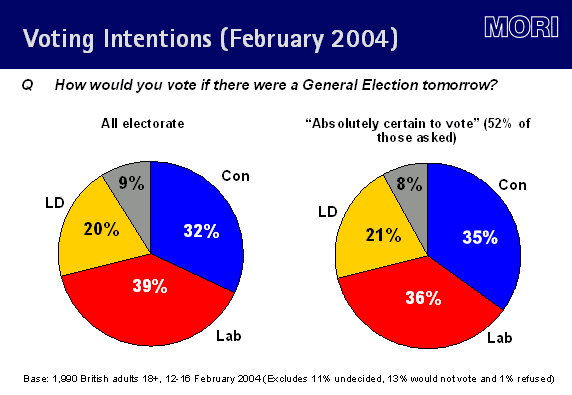The Grand Tradition
Peter Snow, perhaps Britain's keenest poll watcher -- and his super wife, CBC Bureau Chief Ann McMillan -- were at the American Ambassador's President's Day reception last month. He wanted to know what in the world has happened to the polling fraternity and was MORI going to restart (sic) our regular series of monthly poll reports again now that we have an election looming (15 months and counting). I was surprised he's not hardwired to our website (although he says he is), and reminded him that our monthly poll record is still unbroken since it began in 1979, nearly 25 years ago and is there for all to see.
Gallup's long since lost its interest in regular monthly polling, which is a sad loss to those of us who have followed the ups and downs of party fortunes over the years (their polls went back to the War). When The Telegraph cancelled its contract with Gallup several years ago and switched to the Tories' pollsters, Yougov, who use their panel of internet responders to plot the political temperature of the entire country, Gallup gave it up.
Harris, stalwart since the 70s (first as Opinion Research Centre) gave up before the last election. NOP, like ourselves, has the occasional poll in The Independent, but has decided not to continue polling voting intentions monthly, only on commission. ICM gets good space, but patchy reporting of its monthly findings, in The Guardian.
MORI appears in the Financial Times pretty regularly, but they seem not to wish to be committed to publish a consistent monthly political monitor. They do like to publish poll 'blockbusters' -- three last year over several days each, mainly written up by their excellent Political Editor James Blitz with an interpretative inside column from me. They also commission occasional polls and publish columns from me when there's a shift in the political winds.
But enough of this background, what's the news from the hustings?
Our latest published poll (FT, 19 Feb) found that among those 52% who said they were 'absolutely certain' to vote at the next election, Labour had a narrow 1% lead over the Conservatives, on 36% compared with 35% for the Conservatives, with 21% for the Liberal Democrats, and 8% for the collective 'others', including the Scot and Welsh Nats, Greens, UKIP, etc.

These findings, based on the appallingly low turnout estimate of 52% (the 2001 turnout was 59%), would project to a loss of about 40 seats from Labour, a gain of about 40 seats to the Tories, and perhaps one gain for the Lib Dems, although there will of course be variations in individual seats, and deviations from the national swing, on these figures 4.2% to the Conservatives.
But unlike the truly awful write-up of the London poll in the Standard recently, this does not mean a forecast of the outcome of an election five months away (London) or fifteen months away (General Election). My old client Harold Wilson reminded me, and all of us, that 'a week is a long time in politics', and never did he have a longer week than in June 1970, my first election in this interesting country.
That's the good news for Labour; the bad is that only 27% of the electorate say they are satisfied with the performance of the Government, and only a few more, 31%, are satisfied with Blair -- but that's a bit, just a bit, better than Michael Howard who is on 29%, and both are behind Charles Kennedy's 39%.
When we measure concern over the issues facing Britain, asking an open-ended question so as to probe the public mood, monthly polling comes into its own, tracking the things bothering the body politic. It is disturbing to see that race relations/immigration is now running second, only slightly behind the continual concern of the British electorate, the state of the National Health Service.
The table below is the last quarter's results for the key political questions. I've had the opportunity from time to time in these columns to report on a variety of themes based on the evidence of survey research, and -- since a consistent reporting of the key questions is no longer happening -- you'll find it all on the MORI web site (www.ipsos-mori.com), where you'll locate the precise question wording, expanded information on the latest poll, and our trends going back to 1979.
Perhaps I can convince the Editor to squeeze a table like the one below in every month from now on until the next election, which I still think will be 5 May 2005. I'll try.
Key Political Findings
| Month of Polling | Voting Intention ('Certain') | Satisfaction Rating | Economic Optimism Index | Issues Concerning Britain (Top 3) |
|---|---|---|---|---|
| December 2003 | Cons 31% Labour 40% Lib Dems 22% | Government 29% Blair 36% Howard 22% Kennedy 41% | -20% | NHS 41% Education 33% Immigration 29% |
| January 2004 | Cons 35% Labour 37% Lib Dems 21% | Government 25% Blair 32% Howard 30% Kennedy 39% | -21% | NHS 36% Education 32% Immigration 29% |
| February 2004 | Cons 35% Labour 36% Lib Dems 21% | Government 27% Blair 31% Howard 29% Kennedy 39% | -18% | NHS 37% Immigration 35% Education 33% |



